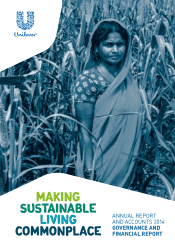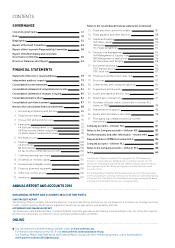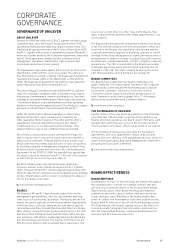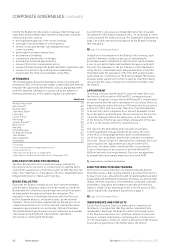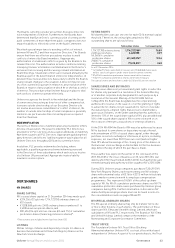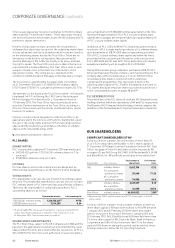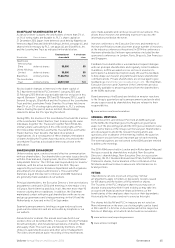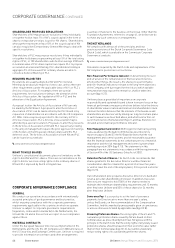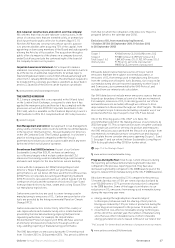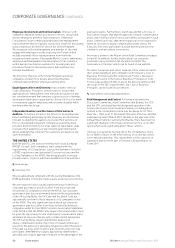Unilever 2014 Annual Report Download - page 12
Download and view the complete annual report
Please find page 12 of the 2014 Unilever annual report below. You can navigate through the pages in the report by either clicking on the pages listed below, or by using the keyword search tool below to find specific information within the annual report.OUR RISK APPETITE AND
APPROAH TO RISK MANAEMENT
Rsk management s ntegral to Unlever’s strategy and to the
achevement of Unlever’s long-term goals Our success as an
organsaton depends on our ablty to dentfy and explot the
opportuntes generated by our busness and the markets we
are n In dong ths we take an embedded approach to rsk
management whch puts rsk and opportunty assessment
at the core of the leadershp team agenda, whch s where
we beleve t should be
Unlever adopts a rsk profle that s algned to our Vson to double
the sze of our busness whle reducng our envronmental footprnt
and ncreasng our postve socal mpact Our avalable captal and
other resources are appled to underpn our prortes We am to
mantan a strong sngle A credt ratng on a long-term bass
Our approach to rsk management s desgned to provde
reasonable, but notabsolute, assurance that our assets are
safeguarded, the risks facing the business are being assessed and
mitigated and all information that may be required to be disclosed
is reported toUnilever’s senior management including, where
appropriate, the Chief Executive Officer and Chief Financial Officer.
ORANISATION
The Unilever Boards assume overall accountability for the
management of risk and for reviewing the effectiveness of
Unilever’s risk management and internal control systems.
The Boards have established a clear organisational structure
withwell defined accountabilities for the principal risks that
Unilever faces in the short, medium and long term. This
organisational structure and distribution of accountabilities
and responsibilities ensures that every country in which we
operate has specific resources and processes for risk review
and risk mitigation. This is supported by the Unilever Leadership
Executive, which takes an active responsibility for focusing on the
principal areas of risk to Unilever. The Boards regularly review
these risk areas, including consideration of environmental, social
and governance matters, and retain responsibility for determining
the nature and extent of the significant risks that Unilever is
prepared to take to achieve its strategic objectives.
FOUNDATION AND PRINIPLES
Unilever’s approach to doing business is framed by our Purpose.
Our Code of Business Principles sets out the standards of
behaviour that we expect all employees to adhere to. Day-to-day
responsibility for ensuring these principles are applied
throughout Unilever rests with senior management across
categories, geographies and functions. A network of Code
Officers and Committees supports the activities necessary to
communicate the Code, deliver training, maintain processes and
procedures (including support lines) to report and respond to
alleged breaches, and to capture and communicate learnings.
We have a framework of Code Policies that underpin the Code
of Business Principles and set out the non-negotiable standards
of behaviour expected from all our employees.
For each of our principal risks we have a risk management
framework detailing the controls we have in place and who is
responsible for both managing the overall risk and the individual
controls mitigating that risk.
Unilever’s functional standards define mandatory requirements
across a range of specialist areas such as health and safety,
accounting and reporting and financial risk management.
PROESSES
Unilever operates a wide range of processes and activities
across all its operations covering strategy, planning, execution
and performance management. Risk management is integrated
into every stage of this business cycle. These procedures are
formalised and documented and are increasingly being
centralised and automated into transactional and other
information technology systems.
ASSURANE AND REASSURANE
Assurance on compliance with the Code of Business Principles
and all of our Code Policies is obtained annually from Unilever
management via a formal Code declaration. In addition, there
are specialist compliance programmes which run during the year
and vary depending on thebusiness priorities. These specialist
compliance programmes supplement the Code declaration.
Our Corporate Audit function plays a vital role in providing to both
management and the Boards an objective and independent review
of the effectiveness of risk management and internal control
systems throughout Unilever.
BOARDS’ ASSESSMENT OF OMPLIANE
WITH THE RISK MANAEMENT FRAMEWORKS
The Boards, advised by the Committees where appropriate,
regularly review the significant risks and decisions that could
have a material impact on Unilever. These reviews consider the
level of risk that Unilever is prepared to take in pursuit of the
business strategy and the effectiveness of the management
controls in place to mitigate the risk exposure.
The Boards, through the Audit Committee, have reviewed the
assessment of risks, internal controls and disclosure controls
and procedures in operation within Unilever. They have also
considered the effectiveness of any remedial actions taken for
the year covered by this report and up to the date of its approval
by the Boards.
Details of the activities of the Audit Committee in relation to
this can be found in the Report of the Audit Committee on pages
56 to 57.
Further statements on compliance with the specific risk
management and control requirements in the Dutch Corporate
Governance Code, the UK Corporate Governance Code, the US
Securities Exchange Act (1934) and the Sarbanes-Oxley (2002)
Act can be found on pages 46, 47 and 48.
PRINIPAL RISK FATORS
Our business is subject to risks and uncertainties. On the following
pages we have identified the risks that we regard as the most
relevant to our business. These are the risks that we see as most
material to Unilever’s business and performance at this time. There
may be other risks that could emerge in the future. We have also
commented below on certain mitigating actions that we believe
help us to manage these risks. However, we may not be successful
in deploying some or all of these mitigating actions. If the
circumstances in these risks occur or are not successfully
mitigated, our cash flow, operating results, financial position,
business and reputation could be materially adversely affected.
In addition, risks and uncertainties could cause actual results to
vary from those described, which may include forward-looking
statements, or could impact on our ability to meet our targets or
be detrimental to our profitability or reputation.
49Unilever Annual Report and Accounts 2014 Governance
RISKS


